Career Services Celebrates Student Success
Career Services celebrates the accomplishments of Colgate students during the 2024–25 academic year. From computer science to law, here are a few highlights:
Arts and Culture
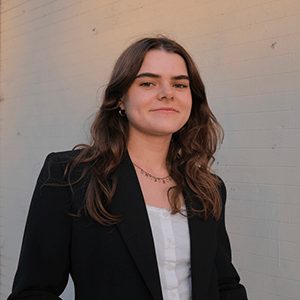
Film and media studies major Leila Bekaert ’25 is heading to Hollywood for a two-month internship with the Oral History Department at the Academy of Motion Pictures and Sciences. “The past experiences and internships I've had independently and through Colgate have contributed to making me a good candidate for this opportunity,” said Bekaert.
Norah Hendrickson ’27, an art history and philosophy double major, is heading to Rockland, Maine, this summer to intern at the Center for Maine Contemporary Art in its education and curatorial departments. She suggests that students consider smaller institutions, which can provide experiences tailored to students’ learning goals.
Education
Will Olszewski ’26, a history major and political science minor, has accepted a residential teaching internship at Phillips Exeter Academy in Exeter, N.H. He explored internship options and the application process during a Career Services appointment. “I wanted to get first-hand experience inside the classroom,” said Olszewski. “Phillips Exeter Academy, with its prestigious standing, was the perfect place.”
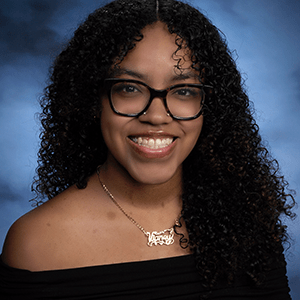
Vianey Morris ’25, a double major in educational studies and Africana and Latin American studies, was accepted into the Harvard Graduate School of Education to pursue a master’s in leadership, organizations, and entrepreneurship. “Don’t limit yourself by underestimating what you can accomplish,” offers Morris. “Educate yourself on the multiple paths and opportunities available to you.”
This summer, Endré Cattouse ’26, a double major in education and sociology, will serve as a literacy teaching fellow with the nonprofit Memphis Teacher Residency and a summer volunteer teacher’s aide at Hamilton Central School.
Business Services, Finance, and Consulting

Agnes Kaumbulu ’28, a double major in applied mathematics and computer science, has accepted an internship at diiVe, a consulting organization in Cape Town, South Africa. With Colgate’s support, she was drawn to the company after hearing past participants praise its immersive learning and professional growth opportunities.
Lia Veit ’25, a physics major and philosophy minor with a wide range of campus involvement, has accepted a full-time offer at Deutsche Bank as an investment banking analyst in Boston. “Take full advantage of the Colgate alumni network, and build up your interviewing skills,” she suggests. “Anyone can become great at it with practice and preparation.”
This summer, Aidan Sulimirski ’26, a mathematical economics major and philosophy minor, will intern at BlackRock as an analyst on product strategy in New York City. Audrey Giltner ’25, a psychological and brain sciences major, is heading to Chicago after graduation to work as a copywriter at Core-Rx Communications. She credits Career Services for teaching her how to frame her experiences to highlight the value of adaptability, strong communication, and analytical thinking — essential skills in the advertising world.
Etiosa Ojefua ’26 has taken a client sales summer internship in New York City with PatientPoint, a leading digital health company specializing in patient engagement solutions. “Colgate’s Four-Year Career Development Plan has been of great help,” said Ojefua. “It allowed me to map out a plan effectively since my first year, and through connections with multiple alumni, my career has been continuously strengthened.”
Technology
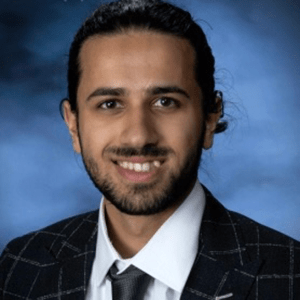
Computer science and mathematics double major, Tajveer Singh Dhesi ’25, will pursue a computer science PhD at the University of Chicago. He credits his success to talking to professors and Career Services, along with pursuing an independent study project.
Yuliia Heleveria ’27, a double major in computer science and applied mathematics, was offered a technology and transformation summer internship at Allianz Technology of America in Minneapolis, Minn.
Health Care
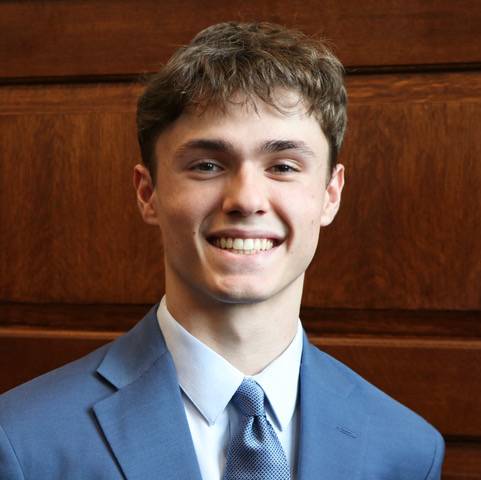
Jeff Arigo ’26, who majors in biology and minors in chemistry, was accepted into the pediatric oncology education program at St. Jude Children's Research Hospital in Memphis, Tenn. He was inspired to gain further hands-on research experience after working in Professor Engda Hagos' cancer biology lab.
Anna Mednick ’25, a neuroscience major, was accepted into the Columbia University School of Nursing Masters Direct Entry Program. Her previous experiences volunteering for NewYork Presbyterian Brooklyn Methodist Hospital and the Hospital for Special Surgery gave her the confidence to apply to the program. She recommends volunteering in big hospital systems to gain hands-on experience in the field.
Biology and Spanish double major Alisha Greenstein ’26 will return this summer to the Johns Hopkins School of Medicine to conduct a research internship in the psychiatry and behavioral sciences department. Erin Mays ’25 is a neuroscience major double-minoring in sociology and global public and environmental health. After graduation, she plans to pursue a master of public health in applied epidemiology at the University of North Carolina at Chapel Hill.
Sam Kumar ’25, a psychological and brain sciences major, will pursue a master’s in clinical mental health counseling at William James College. Isabella Gregory ’25, an environmental studies major with minors in global public and environmental health and women’s, gender, and sexuality studies, was accepted to the London School of Hygiene and Tropical Medicine to pursue a master’s in public health. Justin Bugarin ’26, a biochemistry major and geography minor, has accepted a summer research internship at Marquette University College of Health Sciences.
Public Policy and Law
International relations major Alba Martínez Angoitia ’25 will pursue a graduate degree in geopolitics and strategic studies at the University Carlos III of Madrid. Cole Blair ’25, an international relations and Spanish double major, will join Kirkland and Ellis as a full-time junior paralegal in New York City after graduation. Tate Fonda ’25, a double major in neuroscience and English literature, will attend Penn State Dickinson Law.
This summer, Sophie Thompson ’27, an economics and German double major, will intern with the law firm Rückel & Collegen in Munich. She was inspired to pursue this role after speaking with German American Exchange participants who shared that the internship program helped them advance their German language skills and gain professional experience.
Conrad Chipman ’25 is an Asian studies major and religious studies minor. He was admitted to the Georgetown University Walsh School of Foreign Service Asian Studies master's program in Washington, D.C. He also received a 2025 Boren Fellowship to study Korean in South Korea.
Philosophy major Valentina Meija ’27 will apply her studies this summer through the University of Virginia School of Law Roadmap Scholars Initiative Program. Psychological and brain sciences major, Kelly Ribeiro ’27, will spend her summer participating in Fordham Law School’s IDEAL Program. “Don’t be afraid to ask for help, and don’t fear failure,” suggested Ribeiro.
Political science major Ciara Sanders ’26 accepted a professional support internship offer at Orrick, Herrington & Sutcliffe in New York City. Jaharra Anglin Stubbs ’25, a double major in political science and women’s, gender, and sexuality studies will pursue a JD at the American University Washington College of Law.
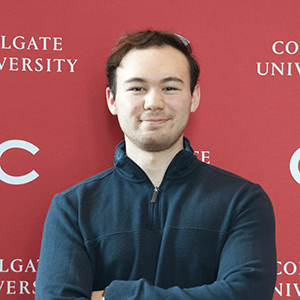
Boen Beavers ’26, a double major in political science and Russian and Eurasian studies, has secured a summer internship with the U.S. Defense Counterintelligence and Security Agency in Quantico, Va. He has also been accepted to the Geneva Graduate Institute through Colgate's dual AB+MA program, where he will pursue a degree in international and development studies.
Beavers credits his time at Colgate with these experiences. “Colgate University’s powerful connections — whether through alumni, accomplished faculty, or other higher education institutions — can provide students with opportunities they could not find at other universities.”
Career Services staff congratulates all Colgate students on their achievements. For advising appointments to discuss your professional ambitions, call 315-228-7380 or use this form.
Latest All News
- Two Colgate Students Lead Projects for Peace AbroadTwo Colgate Students Lead Projects for Peace Abroad tmfonda@colgate.edu This summer, Colgate students Harshitha Talasila ’26 and Kajol Luplunge ’28 have been selected as two of 125 recipients of Projects for Peace grants. Accepted from a pool of applicants at partner institutions across the globe, their projects address issues of substance abuse, mental health, and women’s health internationally. To date, there have been more than 2,000 Projects for Peace in over 150 countries — Talasila and Luplunge’s initiatives now join the list. Harshitha Talasila ’26 On July 1, Talasila arrived in Vijayawada, India — the site of her Projects for Peace fellowship and, more personally, her birthplace. “I immigrated from India to the States when I was five,” she explains, “and wanted to give back.” Her project partners with a nonprofit, Young Indians, and centers around the subjects of mental health and drug abuse. An environmental studies and peace and conflict studies double-major, Talasila developed the idea for her project by consulting family members in Vijayawada. She asked, “What is a really pressing issue here?” and became aware of rising drug-abuse cases and a lack of dialogue about mental health, especially in the school system. “In India, these topics are often stigmatized,” she says. “This can lead to a lack of support for individuals, with broader long-standing impacts on a community.” In preparation for her project, Talasila consulted Shaw Wellness Dietitian Allison Bowers and Alcohol and Drug Services Counselor Stephen Elfenbein. Additionally, she spoke to her former advisers with the Dutchess County Youth Council of Poughkeepsie, N.Y., to source public speakers. In association with Young Indians (Yi), each session of her program takes place at a local University or school. There, Talasila and other speakers share information about various drugs, abuse, and associated mental health concerns. “When the project originally started, we weren’t sure if we would get a really strong response,” shares Talasila. “But the minimum class size we’ve had is 150 students.” Following their presentation, Talasila hosts a Q&A with program participants and circulates feedback forms. “A lot of the feedback has been, ‘Hey, no one’s ever talked to us about this,’” she says. “And by the end, I feel like a good majority of our participants walk out knowing more about the topic.” For Talasila, though, the project is about more than education: it’s a step toward long-term change. “We must start at the individual and local community levels to build peace,” she argues. “Peace isn’t just about the absence of conflict — it’s about creating the foundation where communities are able to thrive and support one another.” Kajol Luplunge ’28 In partnership with peers at Clark University and volunteers at Diyo South Asia, an NGO she co-founded with peers in high school, Luplunge’s Project for Peace is based in Sankhuwasabha, Nepal. There, her project is working to address both practical and societal challenges Nepalese women face during their menstrual cycle. “In Nepal, menstruation is often treated as a taboo rather than a physiological process,” explains Luplunge, who co-founded Diyo South Asia to address such concerns. “Some girls don’t make it through school because they don’t have access to proper facilities, leading to higher rates of child marriage and other long-term consequences.” A major directive of Luplunge’s project is to build clean, well-lit, and hygienic bathrooms with proper disposal facilities in two government schools in Sankhuwasabha. By doing so, she and volunteers aim to provide girls with the safety and privacy needed to stay in school during their periods. “We’re also teaching 57 women how to make reusable pads, so they can improve access and share this information with their communities,” she adds. A third phase of Luplunge’s project is reproductive education. “Menstruation shouldn’t be a secret,” she says. By hosting workshops for 400 boys and 500 girls, she aims to spread awareness “not just about biology, but about discussing these topics sensitively and openly.” As Luplunge completes a neuroscience research project in Hamilton, she is continuing to write articles, draft interview questions for local women, and prep slides for the project. “Helping others has always been part of how I grew up,” she says. “This project is specific to the summer, but we’re planning more.” The Projects for Peace program was founded in 2007 with a $1 million investment from Kathryn Wasserman Davis, a philanthropist and longtime advocate for international peacebuilding. Interested Colgate students can apply through the University’s Office of National Fellowships and Scholarships. News and Updates Student Harshitha Talasila leads a workshop on mental health and drug abuse at Velagapudi Ramakrishna Siddhartha Engineering College in Vijayawada, India.
- Meredith Shapiro ’28 Studies Climate Signals Through Clam ShellsMeredith Shapiro ’28 Studies Climate Signals Through Clam Shells tmfonda@colgate.edu Meredith Shapiro ’28 intends to major in environmental geology, so she’s getting a jump-start on fieldwork experience this summer, completing a research project with Professor of Earth and Environmental Geosciences Paul Harnik and Professor of Physics Rebecca Metzler. As part of a team of student researchers, Shapiro is examining how climate change and algal blooms impact marine life in coastal regions — through the eyes of a specific mollusc species. Within the collaborative project, Shapiro belongs to the Nucula team, examining the Atlantic nut clam (Nucula proxima). Other teams, such as the barnacle team and the bryozoa team, research separate organisms with a similar objective: to discern how climate change impacts trait variation. By considering one species, Shapiro has garnered a detailed understanding of the Atlantic nut clam’s structure. “The clams themselves,” she explains, “are composed of three layers: nacre [also known as mother of pearl], a prismatic layer, and a thin skin-like external layer.” Shapiro’s primary research focus is the nacreous layer, made up of tablets that are each only microns in size. “The size of these tablets has been found to correlate with environmental factors such as pH and temperature in the regions where these shells were formed,” Shapiro says. Such regions, including the Gulf of Mexico and coastal areas along Maine, are monitored by state and federal agencies to support ecosystem health. In the sixth week of her project, Shapiro and her peers met with one of these groups — the Maine Department of Marine Resources — for an immersive research excursion. “We had two days of active fieldwork there, touring nearby labs and collecting samples on a boat,” says Shapiro. On the water, “we dropped a big scientific claw machine down to the bottom of the sea floor to grab sediment, sieving it to remove any excess.” While many of the specimens they gathered were left for the benefit of Maine’s Department of Marine Resources, they brought home samples to analyze and compare to materials gathered by Colgate students in past years, sourced primarily from the Gulf of Mexico. From here, Shapiro and peers will continue to analyze samples from coastal Maine and Mexico to draw greater observations about the Atlantic nut clam species and assess their hypothesis: whether the nacreous layer becomes thicker as coastal waters get warmer. “I am proud to be doing this research,” says Shapiro. “We hope that, from it, we can better understand the impacts of climate change on marine ecosystems.” Academics Natural Sciences and Mathematics Research News and Updates Student Department of Earth & Environmental Geosciences Meredith Shapiro ’28
- TIA Venture Introduces Model to Automate Vanilla FarmingTIA Venture Introduces Model to Automate Vanilla Farming Contributing Writer “Vanilla is everywhere,” says Jahanvi Chamria ’28. “It’s there in chocolate, perfumes, and almost every dessert in some quantity.” So when she and Diya Badola ’25 launched a TIA venture focused on hydroponic farming — a method of growing plants in a water-based nutrient solution without soil — they chose to center their efforts on vanilla: a valued, notoriously delicate crop. Their venture, Shneer Agritech, introduces a fully automated hydroponic system designed to to halve production time and significantly reduce labor costs. Based in Jaipur, India, Shneer Agritech operates on a small plot of land where Chamria and Badola are testing their technologies. A computer science and physics major, Chamria credits “Colgate’s focus on a well-rounded education” for strengthening her ability to “conduct research and grasp new scientific concepts.” For the venture, she has programmed a system of sensors and alarms to water and deliver nutrients to the crop, eliminating the need for human oversight. “With this system, no person has to physically check if everything’s okay,” she explains. “The system just takes care of itself, and it fully automates labor costs.” When pH and carbon dioxide levels fall below a certain threshold, the sensors activate, triggering the delivery of water or nutrients through a network of tubes. Though the crop grows without soil, it is supported by a porous aggregate — in this instance, lava rocks — which allow for proper drainage. The method, Chamria and Badola report, uses “roughly 80% less water than traditional vanilla farming.” “Vanilla is one of the world’s most valuable spices, yet traditional farming is inefficient, costly, and environmentally unstable,” adds Chamria. “Our smart irrigation system ensures precisely timed nutrient dosing, while a built-in filtration unit preserves water purity and reduces waste.” Chamria and Badola’s first batch, harvested this year, consisted of about 16 plants grown in 1.5 years — half the time needed for traditional cultivation. Their larger mission further addresses volatility and exploitation in the global vanilla trade, particularly in Madagascar, where the bulk of the world’s vanilla is produced. “With rising global demand and increasing preference for ethically sourced, premium ingredients, we’re aiming to provide food manufacturers, importers, and fragrance companies with a reliable, high-quality vanilla supply,” says Chamria. In the coming months, the venture will continue to take shape as the team participates in the TIA Summer Accelerator, an eight-week program designed to help students and recent alumni build their ideas into businesses. “We were able to grow one batch, and it turned out pretty well. Now, through TIA, we’re looking at a larger setup,” says Chamria. “Of course, we have a robust, working idea — I’m confident that our TIA mentors will continue to help us transform it into a sustainable business.” Entrepreneurship News and Updates Student tia
- Counseling and Student Health Services Launch Unified Health Records SystemCounseling and Student Health Services Launch Unified Health Records System tmfonda@colgate.edu A new, unified electronic health records (EHR) system now allows consenting students to receive coordinated care across Colgate’s Health and Wellness (H&W) services. The development is made in an effort to reaffirm the University’s commitment to whole-person health and data security. Spearheaded by Assistant Vice President for Wellness and Director of Counseling and Psychological Services Dawn LaFrance and her H&W colleagues, the new system enables shared HIPAA-compliant communications and access to comprehensive student records. LaFrance praises the EHR as “a way to approach the healthcare that we provide students in a more holistic way.” Headaches, for example, might be a concern that Student Health Services would help with, “but they may also be stress-related,” says LaFrance. “In order to really be thoughtful about the mind and body working so closely together, an integrated system helps us put all of those pieces in place.” To opt in, students arriving in the fall semester must consent to share healthcare communications across their care team, which may include staff from the Counseling Center, Haven, the Shaw Wellness Institute, and Student Health Services. “Students should know that this system does not involve the dean’s office or the faculty — it’s just these four departments,” says LaFrance. Along with the use of this new system, LaFrance adds, “we’re holding more staff meetings to promote shared wellness across departments. The more that we can do those kinds of things, the more that we’ll be able to use each other’s expertise when we’re helping a student.” Campus Life Wellness Faculty & Staff
- Colgate in the Media: June 2025Colgate in the Media: June 2025 kputman@colgate.edu Colgate University faculty, staff, and alumni regularly provide their expertise and contribute to national and regional media outlets, shaping discussions around vital research and current events. Colgate Receives $50M Gift for Its Third Century Campaign Inside Higher Ed Five Alumni Give Colgate University A Record $105 Million Forbes Colgate U. Lands $105 Million for Student Housing Campus The Chronicle of Philanthropy 3 Colgate projects: How do they affect the university and the Village of Hamilton? Observer-Dispatch Is the Trump administration helping ‘viewpoint diversity’ on campus? The academy has something to say Deseret News, President Brian W. Casey Sending Good Vibes Harper’s Bazaar, Artist Devon Cunningham Former Syracuse Mayor Stephanie Miner on her new book, 'Madam Mayor' Spectrum News 1, Charles Evans Hughes Visiting Chair of Government and Jurisprudence in the Department of Political Science Stephanie Miner This College Student Wanted Privacy - His College Couldn't Give Him Any Hackernoon, Assistant Professor of Computer Science Noah Apthorpe Gotham EDU Film And Media Career Development Program Sets 2025 Cohort Deadline, Isabella Ohrt ’25, Brittany Cohen ’26, Grace Owusu-Amoah ’26, and Shuhei Matsutoya ’28 New York Sirens select Kristýna Kaltounková with No. 1 pick in 2025 PWHL Draft The Athletic, Kristyna Kaltounkova ’25 Antonio Delgado is running for New York governor, challenging Kathy Hochul Gothamist, Antonio Delgado ’99 US president Donald Trump officially nominates new ambassador to Romania Romania-Insider.com, Darryl Nirenberg ’81 Faculty News Alumni News and Updates Alumni Faculty & Staff
- Jennifer Brice to Serve as Gretchen Hoadley Burke ’81 Endowed Chair in Regional Studies for 2025–26Jennifer Brice to Serve as Gretchen Hoadley Burke ’81 Endowed Chair in Regional Studies for 2025–26 sdevries@colgate.edu Professor of English and Creative Writing Jennifer Brice has been appointed to serve as the Gretchen Hoadley Burke ’81 Endowed Chair for regional studies for the 2025–26 academic year. Brice is the author of three books: The Last Settlers, a work of documentary journalism; Unlearning to Fly, a memoir-in-essays; and Another North: Essays in Praise of the World That Is. She teaches courses in creative writing and contemporary literature, including True Crime and Living Writers. This fall, Brice will teach ENGL 374: Creative Nonfiction Workshop, with a focus on writing about place and the natural world, especially in relation to the upstate region of New York. The workshop will include the reading and writing of creative nonfiction, with an emphasis on the memoir and the personal essay. As part of the course, students will also present a community reading of their writing about the region. Robert Cowser’s anthology, Why We’re Here: New York Essayists on Living Upstate, will serve as a central text, along with a selection of writing from The Best American Science & Nature Writing series, as well as some classics of nature writing by such writers as H.D. Thoreau, Wendell Berry, Annie Dillard, John Burroughs, Terry Tempest Williams, John McPhee, and Sherry Simpson. In addition to readings and discussions, students will also journal weekly and conduct research to create essays of their own as part of a final portfolio of a single or several shorter essays. Brice plans to use the funding and support provided to the Burke Chair to create additional opportunities for the students taking the course, including inviting local experts and colleagues in the biology, geology, geography, and environmental studies departments to speak about the natural history of the region. The course will also include a weekend of hiking and canoeing at Camp Colgate in September with Brice’s students in ENGL 217: Introduction to Creative Writing. At the conclusion of the course, Brice said she plans to include a public reading by the students in downtown Hamilton and produce an anthology of the best student writing from the semester. The Gretchen Hoadley Burke ’81 Endowed Chair for Regional Studies was established in 2006 by Stephen Burke ’80 and Gretchen Hoadley Burke ’81. The Burke Chair aligns with the mission of the Upstate Institute to promote and advance a broad and deep understanding of the diverse cultural, social, economic, and environmental resources of upstate New York through community-based research, the reciprocal transfer of knowledge, and civic engagement. Academics Arts and Humanities Faculty News Research Centers and Institutes People Faculty & Staff Upstate Institute Department of English and Creative Writing






